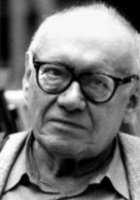Ernst Jandl
Ernst Jandl Poems
TRANSLATED BY JOSHUA WEINER
rilke's separation
the unusual rilke
and the usual rilke
are stuck in their sameness
the unusual rilke
and the usual rilke
would have stayed together
the unusual rilke
and the usual rilke
would have to separate
the unusual rilke
and the usual rilke
both knew it
rilke's breath
1
rilke
breathed
the air
the good air
2
rilke
breathed
without pause
rilke's nose
entrance and exit
of the air
it knew
stench
scent
aroma
handkerchief
sniffles
rilke's name
rilke
said he
when asked for his name
rilke
one said
when asked for his name
or
never heard of him
rilke, unrhymed
rilke
said he
then he said
cuke
then quietly
cloud
rilke's boat
taking a stroke
sitting there
sitting there
taking a stroke
rilke's drawer
1
he pulled out
the drawer
he put something
in
something
was in there
he pushed in
the drawer
2
he pulled out
the drawer
something
was in there
he took something
out
he pushed in
the drawer
3
he pulled out
the drawer
nothing
was in there
he put nothing
in
he left the drawer
open
rilke's chest
1
he lifted up
the lid
he put something
in
something
was in there
he shut
the lid
2
he lifted up
the lid
something
was in there
he took something
out
he shut
the lid
3
he lifted up
the lid
nothing
was in there
he put nothing
in
he left the chest
open
rilke's shoe
rilke's shoe
was one
of two
each shoe of rilke's
was one
of two
rilke in shoes
always wore
two
calf to calf
stood rilke
jutting up from his shoes
rilke's window
he opened
the window
stuck his head out
pulled his head in
closed it
he opened
the window
morning air
rushed in
evening air
night air
he closed
the window
rilke's glass
rilke took a glass
filled it with water
lifted it to his mouth
drank
rilke's hand
rilke's hand and rilke's hand
hanging by his side
rilke's hand in rilke's hand
the one in the other
rilke's hand in the hand of another
greeting him
rilke's hand at rilke's mouth
sensing it there
rilke in conversation
someone asks
rilke answers
rilke asks
someone answers
neither is very happy about it
neither is very sad
rilke's reward
this now
was his reward
nobody was certain
what he meant
rilke
wept
rilke's contradiction
and yet small and white
and yet big and black
and yet small and black
and yet big and white
and yet small and big
and yet white and black
and yet small and black
and yet big and small and black
rilke's eyes
rilke opened his eyes
everything was visible
nothing was invisible
rilke shut his eyes
nothing was visible
everything was invisible
rilke opened his eyes
nothing was invisible
everything was visible
rilke shut his eyes
nothing was visible
nothing was invisible
rilke's weight
rilke is being
relieved of his weight
so roughly does the earth
raise her son
...
diese gedichte
sind fürchterlich
das sagt er
und das sage ich
meine er meine
meine ich seine
meine er seine
meine ich ebenfalls seine
diese gedichte
sind fürchterlich
das sagt er
und das sage ich
meine er beide
beiden zu leide
meine zu leide
ihm nur seine ich
...
er august stramm
sehr verkürzt hat
das deutsche gedicht
ihn august stramm
verkürzt hat
der erste weltkrieg
wir haben da
etwas länger gehabt
um geschwälzig zu sein
...
Ernst Jandl Biography
Ernst Jandl was an Austrian writer, poet, and translator. Influenced by Dada he started to write experimental poetry, first published in the journal "Neue Wege" ("New Ways") in 1952. He was the life partner of Friederike Mayröcker. In 1973 he co-founded the "Grazer Autorenversammlung" in Graz, became its vice president in 1975 and was its president from 1983 to 1987. In his poems are characterized by German language word play, often at the level of single characters or phonemes. For example, his famous univocalic poem "Ottos Mops" (in English, "Otto's Pug") uses only the vowel "o". Of course, poems like this cannot easily be translated into other languages. Most of his poems are better heard than read. His lectures were always known as very impressive events, because of the particular way he pronounced his poems. Poems like "schtzngrmm" (his version of the word "Schützengraben" which describes the trenches of the World War I) can be understood only if read correctly. It is an experimental poem in which he tells the sounds of war only with combinations of letters, which sound like gunfires or detonating missiles. He has translated Gertrude Stein, Robert Creeley's The Island, and John Cage's Silence. Some other of his best known poems are "lichtung" (also known as "lechts & rinks" [sic], in English "left and right") and "kneiernzuck". An example of a short poem, written in English: three wives i never remember my second wife i never remember my third wife i always remember what i always remember ain't ever even had a first wife)
The Best Poem Of Ernst Jandl
Kommentar
Daß niemals
er schreiben werde
seine autobiographie
daß ihm sein leben
viel zu sehr
als dreck erscheine
daß auch nur wenige
punkte, blutige
er noch erinnere
daß aber niemals
er zögern werde
in den dreck zu fassen
um herauszuziehen
was vielleicht
einen stoff abgäbe
für poesie
seinen widerlichen
lebenszweck
